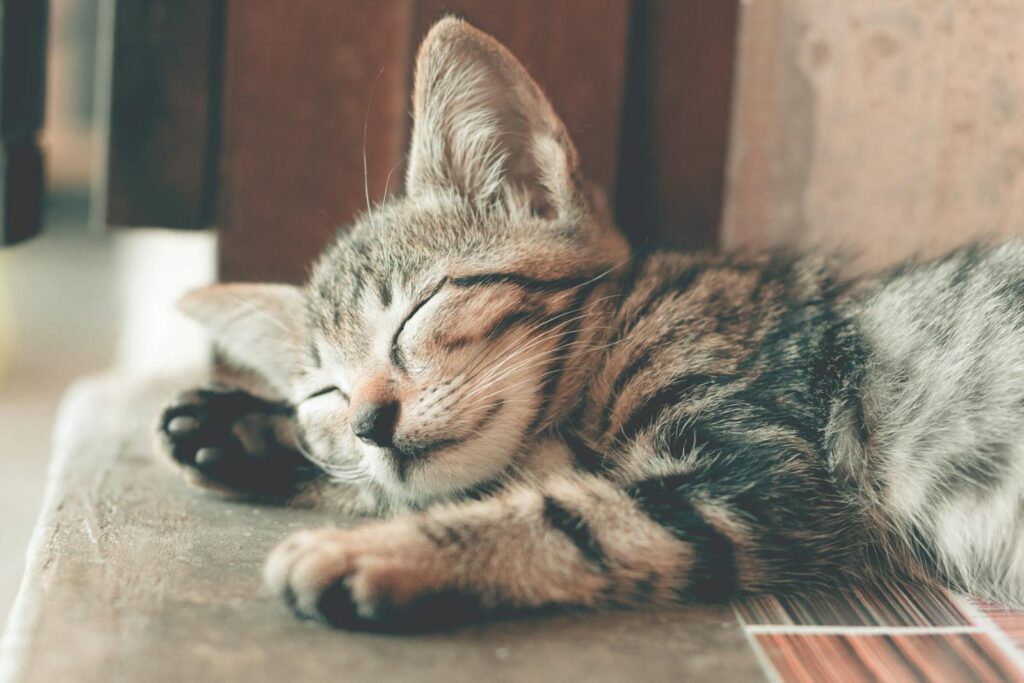Ever noticed your feline friend acting odd or skittish? Just like humans, cats can experience stress and anxiety. Their behaviors might seem puzzling, but they are often clear indicators that something is amiss. Understanding the root cause of their discomfort is crucial for their well-being and your peace of mind.
“Anxiety in cats often manifests as changes in behavior, grooming habits, or even appetite,” says Dr. Jane Parker, a renowned veterinarian.
Your furry companion relies on you to create a serene and harmonious environment. So, let’s delve into the professional opinions on how to handle stress and anxiety in.
Common signs of stress and anxiety in cats
Cats often exhibit changes in their eating habits when they are stressed or anxious. This can manifest as a loss of appetite or, conversely, overeating. Monitoring your cat’s food intake can provide early clues to their emotional state. Alterations in grooming behavior are another common sign of stress and anxiety in cats. Some cats may over-groom, leading to bald patches and skin irritation, while others may neglect grooming altogether, resulting in a matted or unkempt coat.
Changes in litter box habits can indicate stress or anxiety. A cat that suddenly starts urinating or defecating outside the litter box may be experiencing emotional distress. This behavior can also be a sign of a medical issue, so it’s important to consult a veterinarian. Vocalization patterns can change when a cat is stressed or anxious. Increased meowing, yowling, or other vocalizations, especially if they occur at unusual times, can be a sign that your cat is feeling uneasy.
Behavioral changes such as increased aggression or withdrawal are common indicators of stress and anxiety in cats. A normally friendly cat may become irritable or even aggressive, while a sociable cat may start hiding more frequently. Restlessness and hyperactivity can also be signs of stress. A cat that paces, has difficulty settling down, or engages in frantic activity may be experiencing anxiety. Physical symptoms like excessive shedding, dilated pupils, and a tense body posture can also indicate stress or anxiety. These signs are often accompanied by other behavioral changes and should be taken seriously.
- Approximately 40% of cats experience stress-related behavioral issues
- Over 50% of cat owners report their pets exhibit signs of anxiety
- Around 30% of cats show symptoms of separation anxiety
- Stress and anxiety in cats can lead to a 20% increase in veterinary visits
- Behavioral issues related to stress are the second most common reason for cat relinquishment
Which environmental factors can trigger stress in cats?
Changes in the household can be a significant trigger for stress in cats. This includes moving to a new home, rearranging furniture, or introducing new family members, whether they are humans or other pets. Cats are creatures of habit and thrive in stable environments, so any disruption to their routine can cause anxiety. Loud noises and sudden sounds can also be stressors for cats. Events such as thunderstorms, fireworks, construction work, or even loud household appliances can create a stressful environment. Cats have sensitive hearing, and these unexpected noises can be particularly distressing.
Poor litter box conditions can lead to stress in cats. If the litter box is not cleaned regularly, is located in a busy or noisy area, or if the type of litter is changed abruptly, cats may become anxious. A dirty or improperly placed litter box can deter a cat from using it, leading to further stress and potential health issues. Insufficient mental and physical stimulation can contribute to stress in cats. Cats need opportunities to engage in natural behaviors such as hunting, climbing, and exploring. A lack of toys, scratching posts, or interactive playtime can lead to boredom and anxiety.
Insufficient mental and physical stimulation can contribute to stress in cats. Cats need opportunities to engage in natural behaviors such as hunting, climbing, and exploring. A lack of toys, scratching posts, or interactive playtime can lead to boredom and anxiety. Changes in diet or feeding routines can also be a source of stress. Cats are often particular about their food, and sudden changes in their diet or feeding schedule can cause digestive issues and stress. Consistency in feeding times and types of food is important for maintaining a cat’s well-being.
Health issues and pain can be underlying factors contributing to stress in cats. Conditions such as dental problems, arthritis, or urinary tract infections can cause discomfort and anxiety. Regular veterinary check-ups are essential to identify and address any health concerns that may be causing stress.
- Traumatic events or significant changes in the environment can trigger anxiety in cats.
- Symptoms of anxiety can include excessive grooming, aggression, and urinating outside the litter box.
- Untreated anxiety can lead to serious health issues such as Feline Lower Urinary Tract Disease (FLUTD) and Upper Respiratory Infections (URIs).
- Anxiety can negatively impact the quality of life for both cats and their owners.
- Proper socialization and a stable environment are crucial for reducing stress in cats.
What techniques do veterinarians recommend for calming anxious cats?
Veterinarians often recommend creating a safe and quiet environment for anxious cats. This can include providing a designated space where the cat can retreat and feel secure, such as a cozy bed or a secluded corner. Reducing loud noises and minimizing disruptions in this area can help the cat feel more at ease. Another technique is the use of pheromone diffusers or sprays. These products mimic the natural calming pheromones that cats produce, which can help reduce anxiety and promote a sense of well-being. Feliway is a popular brand that many veterinarians suggest for this purpose.
Interactive play is also highly recommended. Engaging a cat in regular play sessions with toys that mimic prey, such as feather wands or laser pointers, can help reduce stress by providing mental and physical stimulation. This can also strengthen the bond between the cat and its owner. Veterinarians may advise the use of calming supplements or diets that contain ingredients known to reduce anxiety. These can include L-theanine, tryptophan, or casein. Always consult with a veterinarian before adding any supplements to ensure they are safe and appropriate for your cat.
Behavioral modification techniques can be beneficial as well. This may involve gradually desensitizing the cat to stressors through controlled exposure and positive reinforcement. For example, if a cat is anxious about car rides, short, positive trips with treats and praise can help reduce fear over time. In some cases, veterinarians might prescribe anti-anxiety medications. These are typically considered when other methods have not been effective and the cat’s anxiety is significantly impacting its quality of life. Medications should always be used under the guidance of a veterinarian to ensure proper dosing and monitoring for side effects.
| Technique | Description | Example |
|---|---|---|
| Desensitization | Gradual exposure to the anxiety trigger in a controlled manner. | Introducing a cat to car rides with short, positive trips. |
| Counterconditioning | Changing the cat’s response to a stressor using positive reinforcement. | Offering treats or praise when the cat is calm near the anxiety trigger. |
| Anti-Anxiety Medication | Prescribed medication to manage anxiety symptoms. | Using veterinarian-prescribed medication for a severely anxious cat. |
How can diet and nutrition impact a cat’s stress levels?
Diet and nutrition play a crucial role in managing a cat’s stress levels. A well-balanced diet ensures that a cat receives all the necessary nutrients to maintain overall health, which can directly influence their mental well-being. Deficiencies in certain vitamins and minerals can exacerbate stress and anxiety, making it essential to provide a nutritionally complete diet. Certain nutrients have been found to have calming effects on cats. For example, tryptophan, an amino acid found in turkey and other proteins, is a precursor to serotonin, a neurotransmitter that helps regulate mood. Including foods rich in tryptophan can potentially help reduce anxiety in cats.
Omega-3 fatty acids, commonly found in fish oil, have anti-inflammatory properties and can support brain health. Studies suggest that omega-3s can help reduce symptoms of anxiety and depression in both humans and animals. Adding a source of omega-3 fatty acids to a cat’s diet may help alleviate stress-related behaviors. Taurine, an essential amino acid for cats, is critical for proper neurological function. A deficiency in taurine can lead to a range of health issues, including anxiety and stress. Ensuring that a cat’s diet includes adequate taurine is vital for maintaining their mental and emotional health.
Hydration is another important factor. Dehydration can lead to a variety of health problems, including increased stress levels. Providing fresh, clean water at all times and incorporating wet food into a cat’s diet can help ensure they stay properly hydrated, which can contribute to a calmer demeanor. Probiotics and prebiotics can also play a role in managing stress. A healthy gut microbiome is linked to overall well-being, including mental health. Probiotics, which are beneficial bacteria, and prebiotics, which are food for these bacteria, can help maintain a healthy digestive system and potentially reduce anxiety in cats.
Feeding routines and consistency are also important. Cats are creatures of habit, and disruptions in their feeding schedule can cause stress. Establishing a regular feeding routine can provide a sense of security and predictability, which can help reduce anxiety.
Are there any specific products that help reduce anxiety in cats?
Several products are specifically designed to help reduce anxiety in cats. One popular option is pheromone diffusers. These devices release synthetic versions of the feline facial pheromone, which can create a calming environment for cats. Brands like Feliway offer diffusers, sprays, and even collars that can help alleviate stress-related behaviors such as scratching and urine marking. Another effective product category includes calming supplements. These supplements often contain natural ingredients like L-theanine, tryptophan, and valerian root, which can help to reduce anxiety levels. Products such as Zylkene and Composure chews are widely recommended by veterinarians for their efficacy and ease of administration.]Calming treats are also a convenient option for managing feline anxiety.
These treats often contain similar ingredients to calming supplements but are presented in a more palatable form. Brands like Greenies and Pet Naturals offer calming treats that can be given as part of a daily routine or during particularly stressful events like vet visits or travel. For cats that are particularly sensitive to environmental changes, anxiety wraps or vests can be beneficial. These products, such as the ThunderShirt, apply gentle, constant pressure to the cat’s body, which can have a calming effect similar to swaddling a baby. They are especially useful during thunderstorms, fireworks, or other loud events.
Interactive toys and enrichment activities can also play a significant role in reducing anxiety in cats. Puzzle feeders, laser pointers, and interactive toys can help to engage a cat’s mind and body, providing a healthy outlet for stress and preventing boredom-related anxiety. Ensuring that a cat has plenty of mental and physical stimulation can significantly improve their overall well-being.
How can I create a stress-free environment for my cat?
Creating a stress-free environment for your cat can significantly improve their overall well-being. Start by establishing a dedicated safe space where your cat can retreat whenever it feels stressed. This could be a cozy corner equipped with a comfortable bed, toys, scratching posts, and some hiding spots. Remember, the key is to ensure this area is free from potential stressors like other pets or loud noises.
Next, consider how environmental enrichment can make a difference. Engaging your cat with stimulating toys, puzzle feeders, and regular playtime can help burn off nervous energy. Ensuring your cat has plenty of vertical spaces, such as cat trees or shelves, allows them to climb and observe their surroundings, which can be both physically and mentally soothing.
Maintaining a consistent routine is also crucial. Cats thrive on predictability, so feeding times, litter box cleaning, and play sessions should be as regular as possible. This consistency helps reduce anxiety stemming from uncertainty or sudden changes.
Additionally, be mindful of how you interact with your feline friend. Avoid forcing your cat into situations it finds stressful and instead, use positive reinforcement to help them build confidence. Gentle petting, calm speech, and treats can create positive associations and gradually alleviate anxiety.
Lastly, consider using products designed to ease stress in cats, such as pheromone diffusers or calming sprays. These can mimic natural feline pheromones and create an environment that feels safe and comforting to your cat.
Conclusion
In conclusion, addressing your cat’s stress and anxiety requires a combination of understanding their behaviors, creating a calming environment, and using veterinarian-recommended techniques and products. By being attentive to your cat’s needs and making evidence-based decisions, you can significantly improve their quality of life. Remember, every cat is unique, and finding the best approach may take some time and adjustment. Stay patient and compassionate, and you’ll ensure your feline friend feels safe, secure, and



